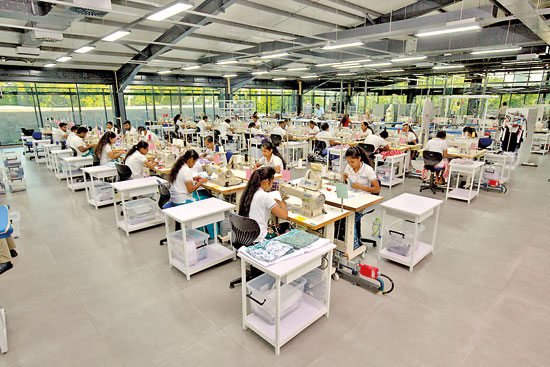Sri Lankan industries take debilitating hit over US tariffs
Sri Lanka, alongside several competing countries in the region, is reaching out to US authorities to negotiate a further cut in US tariffs, now set at an extra 30 per cent for Sri Lanka, as they have a debilitating impact on exports. The reality is that the taxes to the US will eventually range from 30 per cent to 60+ per cent.
If the apparel industry is to face the new tariffs it would mean that Sri Lankan products into the US would become increasingly costly. The previous tariffs for various garments range between 2 -32 per cent to which a further 30 per cent would be added increasing the highest garment export tariffs to over 60 per cent.

File picture of a garment factory. Will workers lose jobs under the new tariffs?
The main concern among apparel exporters globally as well is whether there is parity across them or if there are any big swings in the tariffs on the countries. Parity is imperative for competing nations to carry out their trade with the US.
In fact, delays in the deadline for the imposition of the new tariffs is likely to be due to the fact that buyers would want to ensure their Christmas orders are already in place ahead of any new changes to the tariffs going forward.
FTZ Trade Union leader Anton Marcus told The Sunday Times Business that the trade unions would now want to see how the brands will respond to this situation. “We want to pressurise internationally the brands to make sure they don’t move out from the countries they are in. Globally the unions including those in the US are concerned about the current situation.”
Mr. Marcus pointed out that they “anticipated this situation” and insisted that they knew that when things should turn unfavourable what would happen is that the employers will then turn to the workers and state they are left with no choice but to reduce the workforce and those still around will have to face a curtailment of existing benefits. He noted that during a discussion this week with the government the trade unions were made aware that Sri Lanka is finalising a trade deal on the lines of a Free Trade Agreement with the US.
The rubber industry is one of the hardest hit as they face a sudden 30 per cent tariff from the previous zero tariffs on value added exports to the US.
Former Rubber Traders Association Chairman Manoj Udugampola told the Sunday Times Business that Sri Lanka’s rubber industry stands to lose heavily on the tariffs imposed as the US is likely to opt to purchase from other trading nations with lower tariffs.
Currently Sri Lanka exports US$330 million worth of rubber products to the US annually with tyre and gloves in the value added category likely to become the worst hit. Vietnam, likely to achieve a lower tariff than 30 per cent, is one of the main competitors and India which is hard to compete with if their tariffs would be lower than that of Colombo.
Mr. Udugampola noted that today the tyre companies have paused the orders to the US from Sri Lanka and as a result the country is likely to lose a big market if the competitor nations receive lower tariffs on their exports.
Sri Lanka’s tea industry will also face a challenge as the US is a crucial market for Ceylon Tea as it has become the second largest tea importing country in the world due to its sheer size.
Tea Exporters Association Chairman Huzeifa Akbarally told The Sunday Times in an emailed interview that
previously the tariffs were zero for tea in the US so the 30 per cent is a “huge problem for the tea industry.”
He noted that many buyers have refused to accept any price increases and will easily switch to cheaper options that may be available like Kenya that was given 10 per cent originally. India was at 22 per cent. As a result if any of those tariffs are lower than Sri Lanka “this market will move out of Sri Lanka putting into jeopardy the work done by exporters all these years and handing this growing large market to competing countries,” he said.
The US is the fastest growing tea market in the world with many customers currently adopting healthy lifestyle and switching from carbonated drinks and coffee.
Mr. Akbarally said that the tea industry is “most vulnerable” as the estate workers and smallholders make up the key stakeholder population number of over one million people. With a key market dropping out due to tariffs this will result in discounting the tea prices at the auctions and thus directly hitting the bellies of these workers and small farmers.
Hitad.lk has you covered with quality used or brand new cars for sale that are budget friendly yet reliable! Now is the time to sell your old ride for something more attractive to today's modern automotive market demands. Browse through our selection of affordable options now on Hitad.lk before deciding on what will work best for you!


